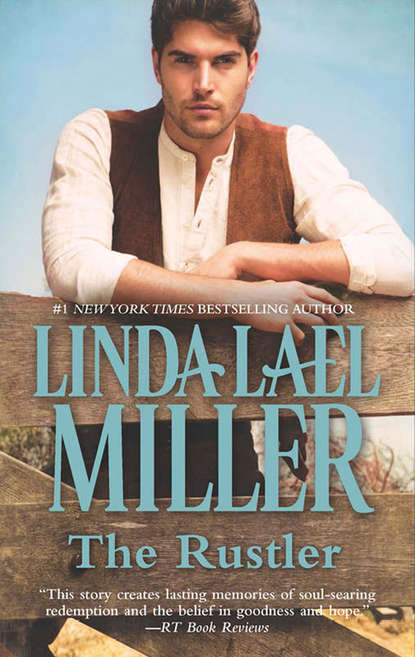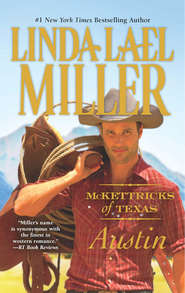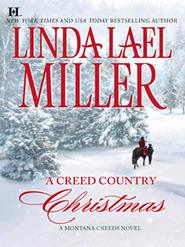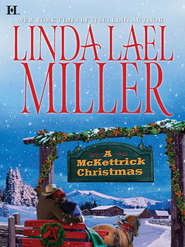По всем вопросам обращайтесь на: info@litportal.ru
(©) 2003-2025.
✖
The Rustler
Автор
Год написания книги
2019
Настройки чтения
Размер шрифта
Высота строк
Поля
Doc Venable stood, too. “I’d be honored,” he said.
CHAPTER FOUR
OWEN’S FACE WAS SCRUBBED, and someone, probably Charles, had slicked down his hair. Standing on the front porch, gazing earnestly up at Sarah, he held out a bouquet of flowers and bravely announced, “Papa said to tell you he’ll be along as soon as he can. He got a telegram at the hotel, and he’s got to answer it.”
“C-come in,” Sarah said, stricken by the sight, the presence, of this boy. Accepting the flowers with murmured thanks, she stepped back to admit him.
Owen moved solemnly over the threshold, a little gentleman in a woolen suit, taking in the entryway, the long-case clock, the mahogany coat tree. Sarah wondered if he ever wore regular clothes and played in the dirt, like other children his age.
And she wondered a thousand other things, too.
“Let’s put these flowers in water,” she said, and started for the kitchen.
“You have gaslights and everything,” Owen marveled, walking behind her. “I thought you’d live in a log cabin, and there’d be Indians around.”
Sarah smiled to herself. “There are a few Indians,” she said. “But you don’t have to worry about them. They’re friendly.”
“Good,” Owen said, with evident relief, as they passed the dining room table—she’d set it for five, since her father was snoring away in his room—and the plates, glasses and silverware sparkled. “I wouldn’t want to get scalped or anything.”
“Nobody’s going to scalp you,” Sarah said, with certainty.
Owen pulled back a chair at the kitchen table and sat while she found a vase for the wild orange poppies he’d apparently picked for her. “Papa says this is the frontier,” he announced.
Sarah’s spine tightened briefly at the mention of Charles. She hoped Doc Venable would be back from his evening rounds before he or Wyatt Yarbro arrived. “We’re quite civilized, actually,” she said, pumping water into a vase at the sink, dunking the stems of the poppies, and setting the whole shooting match in the center of the table.
“Do you live in this great big house all by yourself?” Owen wanted to know. He was small for his age, Sarah noticed, trying her best not to devour the child with her eyes. His feet swung inches above the floor, but he sat up very straight.
“No,” Sarah said, taking a chair herself. “My father and I live here together. Isn’t your house much bigger than this one?”
Owen allowed that it was, then added, “But I’m not there very much. If I’m not at school, I mostly stay with Grandmama. She’s got all sorts of money, but she lives in a town house. That way, she doesn’t need so many servants.”
“Do you like staying at your grandmama’s town house?” Sarah asked carefully.
“Not much,” Owen said. “You can’t run or make noise or have a dog, because dogs have fleas and they chew things up and make messes.”
Sarah didn’t know whether to laugh or cry. “Would you like to have a dog?”
“More than anything, except maybe a pony,” Owen answered.
“Do you like school?” A thousand other questions still pounded in Sarah’s mind, but it wouldn’t be appropriate to ask them.
“It’s lonesome,” Owen said. “Especially at Christmas.”
Sarah stomach clenched, but she allowed none of what she felt to show in her face. “You stay at school over Christmas?”
“My mother doesn’t like me very much,” Owen confided. “And Grandmama always goes to stay with friends in the south of France when the weather starts getting cold.”
“Surely your mother loves you,” Sarah managed.
“No,” Owen insisted, shaking his head. “She says I’m a bastard.”
Sarah closed her eyes briefly, struggling with a tangle of emotions—anger, frustration, sorrow, and the most poignant yearning. So Marjory Langstreet did blame Owen for her husband’s indiscretions, as she’d always feared she might.
“My brothers aren’t bastards,” Owen went on, taking no apparent notice of Sarah’s reaction.
“Do you get along with them?” she asked, after biting her lower lip for a few moments, lest she say straight out what she thought of Marjory and all the rest of the Langstreets. “Your brothers, I mean?”
“They’re old,” Owen replied. “Probably as old as you.”
Sarah chuckled. “My goodness,” she said. “They must be doddering.”
“What’s doddering?”
Just then, her father appeared on the rear stairway leading down into the kitchen, clad in a smoking jacket and the military trousers Sarah had hidden earlier. His feet were bare, and his white hair stood out all around his head. He’d forgotten his spectacles, and he peered at Owen.
“Doddering,” he said, “is what I am. An old fool who can’t get around without somebody to hold him up.”
“Papa,” Sarah said, rising, “you’re supposed to be in bed.”
“Balderdash,” Ephriam snapped. “It’s still light out. Who’s the lad?”
“My name is Owen Langstreet, sir,” Owen said, standing respectfully in the presence of an elder. “Who are you?”
Don’t, Papa, Sarah pleaded silently. “This is my father, Ephriam Tamlin,” she said aloud.
“Those pants,” Owen observed, “are peculiar. How come they have yellow stripes down the side?”
“I wore these trousers in the great war,” Ephriam blustered. Then he saluted briskly. “You’re a mite small for a soldier. Reckon you must be a drummer boy.”
“Papa,” Sarah pleaded. “Please.”
“I smell supper cooking,” Ephriam told her. She’d fried chicken earlier; it was on a platter in the warming oven. “I’m hungry.”
“I’ll bring you a plate,” Sarah promised. “Just go back to bed.”
“I’m not a soldier,” Owen said.
A rap sounded at the back door, and Doc Venable let himself in. Spotting Ephriam standing there on the stairs, he tossed Sarah a sympathetic glance, let his eyes rest briefly on Owen, then went to usher his old friend to his room.
“How come Ephriam can’t eat with us?” Owen asked Sarah, when they’d gone. He looked so genuinely concerned that it was all Sarah could do not to reach out and ruffle his neatly brushed hair.
“He’s sick,” Sarah said.
“Why did he call me a drummer boy? I don’t have a drum.”
“Figure of speech,” Sarah answered.
At that instant, for good or ill, someone turned the bell knob at the front door, indicating the arrival of another supper guest.











